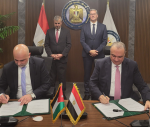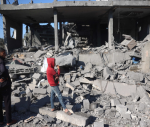You are here
In a world of lies…
Jan 11,2017 - Last updated at Jan 11,2017
In the closing days of last year, The Independent’s regional correspondent Robert Fisk tackled the issue of truth telling in an article titled “We are not living in a ‘post-truth’ world, we are living the lies of others”.
In the body of the article, he argues that “… we always have lied in a world of lies.”
When discussing the lies bandied about in this region, he focuses on coverage of the battle for east Aleppo, where journalists were excluded and social media put out a skewed version of what was happening.
Fisk rightly said “acceptance of one side of the story only” was not only dangerous but damaging to the credibility journalism.
Now that activists (or citizen journalists) tied to armed groups have been allowed to carry out coverage from a battle zone, they can be expected to do the same again from Syria’s northwestern province of Idlib.
They are already providing reliable journalists with skewed coverage elsewhere in Syria.
Let’s take, for instance, the battle that has raged over Wadi Barada and Ain Al Fijeh, the mountain springs that provide 65-70 per cent of the water for the 4-5 million residents of Greater Damascus.
The flow from the springs, controlled since 2012 by rebels who have fallen under the sway of Al Qaeda’s Jabhat Fateh Al Sham (formerly Jabhat Al Nusra) and its ally Ahrar Al Sham, was disrupted by the Syrian authorities in late December after it was polluted by diesel oil and then cut by the insurgents based in Wadi Barada.
This led the Syrian army and Lebanon’s Hizbollah to mount an offensive against the armed takfiris and local armed groups.
During this operation, the water processing facility at Ain Al Fijeh was seriously damaged and put out of action by bombs.
The two sides blame each other for the bombing. Damascus says the facility was detonated by explosives planted by insurgents, while an opposition activist media operator claiming to be in Wadi Barada blames the Syrian and Russian airforces.
Al Jazeera, which is firmly in the insurgent camp, has produced images of the bombs striking around the facility. Other photos posted on the net show a celebrating anti-government fighter standing beneath the collapsed roof of the building.
UN humanitarian spokesman Jens Laerke said the “deliberate targeting of the water infrastructure” had caused the disruption, but admitted that the UN could not identify the culprit because it could not access the area due to fighting.
His were the usual weasel words from an organisation that does not want to antagonise either side.
A source involved in the “reconciliation” process between the government and insurgents told this correspondent on the phone from Damascus that the current confrontation erupted because Wadi Barada residents and local armed elements had, over the previous three months, reached “95 per cent” of an agreement to hand over to Damascus the town and its springs and end their rebellion.
However, he said, Jabhat Fateh Al Sham and Ahrar Al Sham rejected the deal and put diesel into the water as a warning before halting the flow to Damascus. This was not widely reported.
His account is credible.
The government has been making reconciliation agreements with suburbs, towns and villages to the west of Damascus for many months.
Deals were reached for the towns of Qudsaya and Al Hameh in November, involving amnesty for insurgents who chose this option or the transfer of the rest, with their families and personal arms, to Idlib, which has become a gathering ground for armed elements.
Al Hameh is a village located on the Barada River.
Jabhat Fateh Al Sham and Ahrar Al Sham have repeatedly obstructed or delayed reconciliation agreements with a number of cities, towns and villages.
Deals for Zabadani and Madaya, besieged by government forces and Hizbollah fighters, have been blocked.
An agreement for Homs’ Old City was delayed until May 2014 after great destruction.
A Homsi source said the Jabhat then Al Nusra finally agreed to pull out largely because most of its fighters were Syrians.
Last October, UN mediator Staffan de Mistura appealed to Jabhat to leave east Aleppo as its presence there provided the Russians and Syrians with justification for bombing and shelling.
Jabhat, along with Daesh, are excluded from ceasefires.
De Mistura even offered to accompany the group’s fighters from Aleppo to Idlib.
His proposal was rejected and the withdrawal of fighters and evacuation of civilians took place in late December, deepening the suffering of the elderly, women and children.
Having tolerated insurgent-control of Damascus’ water supplies for more than four years, the government would hardly want to wage war against the armed groups over the Christmas and New Year holidays, risking cuts in the flow of the essence of life.
Furthermore, until the disruption took place, authorities had been basking in the glow of the psychological and moral victory of the recapture of eastern Aleppo.
The water crisis has made Damascenes forget everything but how and when they will receive or access water.
Residents consulted by this correspondent blame the insurgents, arguing that they are punishing Damascus for the Aleppo defeat and seek to “blackmail” the city into giving armed men free reign in the countryside west of the capital.
Control of water sources, a key strategic asset, has been used by insurgents in both Damascus and Aleppo to deter operations by government forces.
Water was cut to both government- and insurgent-held Aleppo 40 times since the unrest erupted in 2011, and to Damascus several times, the latest in early July 2015, in response to an offensive against armed groups in the resort town of Zabadani, on the Lebanese border.
The water supply of Homs was always in government hands, so there were no deals there.
In Syria as in other conflicts, the warring sides have made arrangements over fuel and food deliveries.
The Homs oil refinery has continued to function, although it is located in a contested location.
The Syrian Arab Red Crescent and the International Committee of the Red Cross have, with formal permission from Damascus and informal agreements with various insurgent groups, moved across front lines, delivering food, medical supplies and other aid to civilians living in contested towns and villages.
Wounded and ill civilians have been treated in mobile clinics or taken to hospitals in government-held areas.











